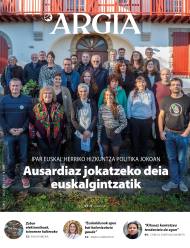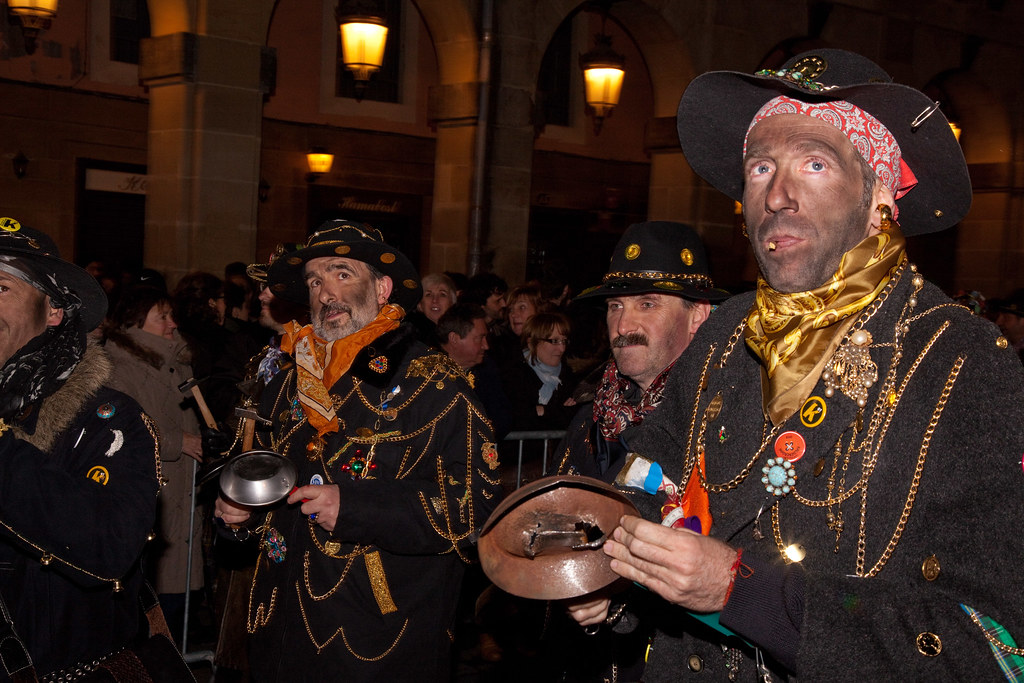From here
From here, from Euskal Herria, nothing has happened as others tell us. Although they are committed, we are not French or Spanish. We are Basques above all strange constitutions and below all battles. We must not, therefore, change our view and take on the view of others. From Euskal Herria we must analyze our history and the past, measure our present and prepare the future.
This Spain, liberal or francoist, left or right, has been designed and built, radically, against the Basque Country in recent centuries. From the 18th century on, the liberal elites of the Spanish monarchy designed a complete strategic planning aimed at imposing on Spain a single state of nation and eliminating both Euskal Herria and other peninsular nations. Since 1776, the standardization of the language has been a declared objective. Spanish, by law and through education, has been imposed and universalized in all territories.
Since then, the strategy has focused on a single language and a single market. Since 1778, the free trade regulation had a rigorous impact on the economic and foral system of the Basque territories. To deepen this influence and make the project of the only nation Spain a reality, they needed the first national constitution, and to do so they enacted the Pepa of 1812, a progressive and progressive norm. The flag of the independence of the French occupants and that of the reactive sectors of the former regime were raised with the intention of presenting the new rule in an attractive way.
This project imposed by the only Spanish nation spends eight constitutions and three wars against the Basques in the last two centuries
They had to seduce, buy, assimilate or otherwise neutralize all the obstacles that hindered the formation of a single Spanish nation-state, and for this they ignited the ideological battle against the Basque forces, believing that the constitution of the Basques itself was an outdated and reactionary rule, the privilege of the Castilian kings (Juan Antonio Llorente dixit). And beyond ideological debate, the argument of military force was very valuable. This was used in 1812 and 1813 when they sent Captain General Castaños Aragorri to “convince” the institutions of Hego Euskal Herria. That Spanish hero, who defeated the Napoleon army itself in the famous battle of Bailén, was of Basque origin, the father of Portugalete in Bizkaia and his mother, born in Ainhoa in Lapurdi. Splinter of the same wood to burst the Basque column. How many times that has happened to us!
In the early nineteenth century, therefore, the conflict between the Spanish project and the whole of the territories of Hego Euskal Herria is present, in its economic, institutional, political, academic and linguistic dimension. Spain, a unified and centralized state facing the Basque Country, a differentiated, foral, Basque nation.
There was only a lack of the armed dimension of this conflict, which also erupted in the two crude wars called Carlist Wars, the first in 1833-1840 and the second in 1872-1876. For the Basques, at least, these were not dynamic conflicts or religious wars. The wars between contradictory national projects were, in full law, the imposed Spanish nation-state and the Basque foreign nation.
This project imposed by the only Spanish nation has spent eight constitutions and three wars against the Basques in the last two centuries, and the post-war constitution of 1978 has used the same parameters as in the beginning of 1812: with arguments of democracy and progress, it seeks to deny the nationality of the Basques and to seduce or neutralize their citizens. You have forgotten that history, when you want to repeat it, becomes farce.
Bidali zure iritzi artikuluak iritzia@argia.eus helbide elektronikora
ARGIAk ez du zertan bat etorri artikuluen edukiarekin. Idatzien gehienezko luzera 4.500 karakterekoa da (espazioak barne). Idazkera aldetik gutxieneko zuzentasun bat beharrezkoa da: batetik, ARGIAk ezin du hartu zuzenketa sakona egiteko lanik; bestetik, egitekotan edukia nahi gabe aldatzeko arriskua dago. ARGIAk azaleko zuzenketak edo moldaketak egingo dizkie artikuluei, behar izanez gero.
I don't want my daughter disguising herself as a Gypsy in the caldereros. I don’t want Gypsy children at my daughter’s school to dress up as Gypsies in caldereros. Because being a gypsy is not a disguise. Because being a gypsy is not a party that takes place once a year, with... [+]
The road goes by steps, and I learned a little while ago that it seems to have already begun. But people also want to learn to fill that sentence with content. Alone we could achieve little, maybe even resignation as soon as we started. Gathering huge crowds can also complicate... [+]
Ez zuen egoki jokatu, neurriak hartu behar ziren, bestela, ez dugu ikasten. Itxuraz, ez zen ohartzen egindakoaren inpaktuaz, normal jarraitzen zuen, batzuetan, ingurukoek baino itxura zoriontsuagoz. Gainera, altuegi hitz egiten du, hori ez zaio inori gustatzen. Darabiltzan... [+]
The Department of Education doesn't understand why public employees have gone on strike. He's got to ask the LAB Syndicate. This union signed an agreement with the department in April 2023. Two years later they have also called for a strike because, unlike the previous ones, the... [+]
Erretiratu berri den lankide-ohi baten omenez, Historiako irakaslea. Bejondeizula!
Hezkuntza-legeek azpimarratzen dute zein garrantzitsua den ikasleengan pentsamendu kritikoa sustatzea. Baina irakasle-klaustroak, garai batean ideien eztabaidarako eta proposamenak... [+]
The liberal democracy of the Western countries has a growing appearance of a minimalist democracy. At the heart of the definition would be respect for changes in government through elections. The authoritarian variant of this was called competitive authoritarianism by political... [+]
Zutabe hau idazten nengoela, gaia aldatu behar izan dut, nire arreta osoa harrapatu dutelako Trumpen muga-zergek. Azalpen gutxi beharko duzue, leku guztietan da berria, Txinako produktuei %10eko zerga eta Kanadako eta Mexikoko produktuei %25eko muga-zergak jarri dizkie. Trumpek... [+]
This wedge that the announcement on the radio Euskadi to replace the bathtub with a shower encourages the commencement of the works in the bathroom of the house. A simple work, a small investiture and a great change are announced. There has been a shift in toilet trends and a... [+]
The year 2025 will lead to a general policy of establishing shorter working weeks, bringing low costs for new hires for companies and an effective direction of change in labour relations.
With the aim of complying with the Spanish government agreement, the reform to shorten the... [+]
I received your e-mail in personal mail on the strike portals. At first, like many others, I thought it was to let you know what options we have in the face of the strike. But no, the e-mail received was a political and communicative movement against the strike.
I will confess... [+]
This weekend I've been thinking about the word 'aesthetic' in relation to a phrase said by a friend: “This work is aesthetic.” I have studied the etymology of the word aesthetic, it seems that its meaning was originally perceived through the senses, and it was later associated... [+]
The other day in Bilbao, I met a friend at the Bira bar. We were very happy at the Tar and I said: “Of course, since you’re Guipúzcoa, hahahaha.” And he insisted that he was not Guipuzcoan. Without me understanding it, I kept saying, “Ah! Is it not? You were born in New... [+]























